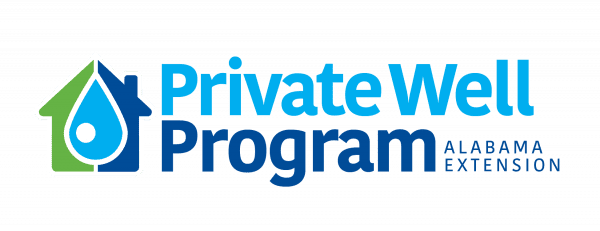Private Well Program

Part of being a responsible well owner is getting your well water tested at least once a year for bacterial contamination. But where should you get your water tested? As a well owner, you have some options.
If you have questions about the basics of testing well water (including why you should test, when you should test, and how to test) visit our list of resources.
County Health Department
A simple way to get your well water tested for bacterial contamination (total coliforms, fecal coliforms) is to contact your county health department office. You can reference the laboratory identification map below to find contact information for a health department near you. Tests provided by the Alabama Department of Public Health (ADPH) may differ in price depending on where you live but are usually very affordable. If you would like to perform a more comprehensive test for substances like nitrates or alkalinity, you may need to reach out to a certified drinking water lab and see what testing services they offer for private well owners.
Certified Drinking Water Lab
The Alabama Department of Environmental Management (ADEM) has a comprehensive list available of all certified laboratories in the State.
So, what does this mean for you? A lab is deemed certified after an inspection by a government agency. ADEM certifies labs in Alabama to test drinking water, and public water systems must use these labs or labs certified by the EPA for nearly all of their monitoring. labs certified by the Environmental Protection Agency (EPA) must use approved methods, successfully analyze proficiency testing samples at least annually for each method and analyte of the desired certification and pass periodic on-site inspections.
If you would like to perform a more comprehensive analysis of your well water, you may want to reach out to a certified drinking water lab. The Alabama Department of Environmental Management (ADEM) certifies private laboratories in the state to analyze water for drinking after they pass a set of requirements.
To receive information about sampling procedures and shipping methods, you will need to contact the laboratory. If you are sampling water to be analyzed at the ADPH state lab, contact your local health department office for sampling instructions.
Contact Information
To view contact information for ADPH offices and private water testing facilities by county, click on the area of interest on the map below.
Autauga County
Autauga County Health Department
219 North Court Street, Prattville, Alabama 36067
(334) 361-3743
ADPH
Baldwin County
Baldwin County Health Department
212 Courthouse Square, Bay Minette, Alabama 36507
(251) 947-3618
ADPH
Barbour County
Barbour County Health Department
P.O. Box 238, 634 School Street, Eufaula, Alabama 36027
(334) 687-4808
ADPH
Bibb County
Bibb County Health Department
281 Alexander Avenue, Centreville, Alabama 35042
(205) 926-9702
ADPH
Blount County
Blount County Health Department
1001 Lincoln Avenue, Oneonta, Alabama 35121
(205) 274-2120
ADPH
Bullock County
Bullock County Health Department
674 Hicks Industrial Boulevard, Union Springs, Alabama 36089
(334) 738-3030
ADPH
Butler County
Butler County Health Department
350 Airport Road, Greenville, Alabama 36037
(334) 382-3154
ADPH
Calhoun County
Calhoun County Health Department
3400 McClellan Boulevard, Anniston, Alabama 36201
(256) 237-4324
ADPH
Chambers County
Chambers County Health Department
5 North Medical Park Drive, Valley, Alabama 36854
(334) 756-0758
ADPH
Cherokee County
Cherokee County Health Department
833 Cedar Bluff Road, Centre, Alabama 35960
(256) 927-7322
ADPH
Chilton County
Chilton County Health Department
301 Health Center Drive, Clanton, Alabama 35046
(205) 755-1287
ADPH
Choctaw County
Choctaw County Health Department
1001 South Mulberry Avenue, Butler, Alabama 36904
(205) 459-4026
ADPH
Clarke County
Clarke County Health Department
22600 Highway 84 East, Grove Hill, Alabama 36451
(251) 275-4177
ADPH
Clay County
Clay County Health Department
86892 Highway 9, Lineville, Alabama 36266
(256) 396-6421
ADPH
Cleburne County
Cleburne County Health Department
90 Brockford Road, Heflin, Alabama 36264-1605
(256) 463-2296
ADPH
Coffee County
Coffee County Health Department
2841 Neal Metcalf Road, Enterprise, Alabama 36330
(334) 347-9574
ADPH
Colbert County
Colbert County Health Department
1000 S. Jackson Highway, Sheffield, Alabama 35660
(256) 383-1231
ADPH
Conecuh County
Conecuh County Health Department
102 Wild Avenue, Evergreen, Alabama 36401
(251) 578-9729
ADPH
Coosa County
Coosa County Health Department
Refer to Tallapoosa County Health Department
Phone number not available
Lab type not available
Covington County
Covington County Health Department
23989 Alabama Highway 55, Andalusia, Alabama 36420
(334) 222-1175
ADPH
Crenshaw County
Crenshaw County Health Department
15 Hospital Drive, Luverne, Alabama 36049
(334) 335-2471
ADPH
Cullman County
Cullman County Health Department
601 Logan Avenue, S.W., Cullman, Alabama 35055
(256) 734-0243
ADPH
Dale County
Dale County Health Department
532 W. Roy Parker Road, Ozark, Alabama 36360
(334) 774-5146
ADPH
Dallas County
Dallas County Health Department
100 Samuel O. Moseley Drive, Selma, Alabama 36701
(334) 872-5887
ADPH
Dekalb County
Dekalb County Health Department
2401 Calvin Drive, Southwest, Fort Payne, Alabama 35967
(256) 845-7031
ADPH
Elmore County
Elmore County Health Department
6501 U.S. Highway 231, Wetumpka, Alabama 36092
(334) 567-1171
ADPH
Escambia County
Escambia County Health Department
8600 Highway 31 North, Atmore, Alabama 36502
(251) 368-9188
ADPH
1115 Azalea Place, Brewton, Alabama 36426
(251) 867-5765
ADPH
Etowah County
Etowah County Health Department
709 East Broad Street, Gadsden, Alabama 35903
(256) 439-2586
ADPH
515 Albert Rains Blvd., Gadsden, Alabama 35901
(256) 543-2884 ext 219
Private (Certified Bacteriological Lab)
Fayette County
Fayette County Health Department
215 1st Avenue NW, Fayette, Alabama 35555
(205) 932-5260
ADPH
Franklin County
Franklin County Health Department
801 Highway 48, Russellville, Alabama 35654
(256) 332-2700 
ADPH
Geneva County
Geneva County Health Department
300 County Road 41, Hartford, Alabama 36344
(334) 684-2256
ADPH
Greene County
Greene County Health Department
412 Morrow Avenue, Eutaw, Alabama 35462-1109
(205) 372-9361
ADPH
Hale County
Hale County Health Department
670 Hall Street, Greensboro, Alabama 36744
(334) 624-3018
ADPH
Henry County
Henry County Health Department
500 Kirkland Street, Abbeville, Alabama 36310
(334) 585-2660
ADPH
Houston County
Houston County Health Department
1781 East Cottonwood Road, Dothan, Alabama 36301
(334) 678-2815
ADPH
1781 East Cottonwood Highway, Dothan, Alabama 36301
(334) 678-2810
Private (Certified Bacteriological)
Jackson County
Jackson County Health Department
204 Liberty Lane, Scottsboro, Alabama 35769-4133
(256) 259-5882
ADPH
P O Box 36 , Bridgeport, Alabama 35740
(256) 495-2594
Private (Certified Bacteriological)
Jefferson County
Jefferson County Health Department
1400 Sixth Avenue South, Birmingham, Alabama 35233
(205) 933-9110
ADPH
Several locations, visit webpage.
(205) 390-3424
Private (Certified Bacteriological)
1108 Ashville Road, Leeds, Alabama 35094
(205) 699-6647
Private (Certified Bacteriological, Certified Chemical)
2515 Fifth Avenue South, Birmingham, Alabama 35233
(205) 581-9500
Private (Certified Chemical)
305 Crawford Steet, Fairfield, Alabama 35064
(205) 788-1747
Private (Certified Chemical)
Lamar County
Lamar County Health Department
300 Springfield Road, Vernon, Alabama 35592
(205) 695-9195
ADPH
Lauderdale County
Lauderdale County Health Department
4112 Chisholm Road, Florence, Alabama 35630
(256) 764-7453
Private (Certified Bacteriological Lab and Chemical Lab)
3103 Northington Ct, Florence, Alabama, 35630
(256) 740-5532
Lab type not available
Lawrence County
Lawrence County Health Department
13299 Alabama Highway 157, Moulton, Alabama 35650
(256) 974-8849
ADPH
Lee County
Lee County Health Department
1801 Corporate Drive, Opelika, Alabama 36801
(334) 745-5765
ADPH
Limestone County
Limestone County Health Department
20371 Clyde Mabry Drive, Athens, Alabama 35611
(256) 232-3200
ADPH
Lowndes County
Lowndes County Health Department
Street, Hayneville, Alabama 36040
(334) 548-2564
ADPH
Macon County
Macon County Health Department
812 Hospital Road, Tuskegee, Alabama 36083
(334) 727-1800
ADPH
9500 Alabama Hwy 14 W, Notasulga, Alabama 36866
(334) 257-3435
Private Lab
Madison County
Madison County Health Department
301 Max Luther Drive NW, Huntsville, Alabama 35811
(256) 533-8726
ADPH
Marengo County
Marengo County Health Department
303 Industrial Drive, Linden, Alabama 36748
(334) 295-4205
ADPH
Marion County
Marion County Health Department
2448 Military Street South, Hamilton, Alabama 35570
(205) 921-3118
ADPH
Marshall County
Marshall County Health Department
150 Judy Smith Drive, Guntersville, Alabama 35976
(256) 582-4926
ADPH
Mobile County
Mobile County Health Department
1110 Schillinger Rd N #200, Mobile, Alabama 36608
(251) 634-9801
ADPH
4320 Midmost Dr, Mobile, Alabama 36609
(251) 344-9106
Private (Certified Bacteriological)
Monroe County
Monroe County Health Department
416 Agriculture Drive, Monroeville, Alabama 36460
(251) 575-7034
ADPH
Montgomery County
Montgomery County Health Department
3060 Mobile Highway, Montgomery, Alabama 36108
(334) 293-6452
ADPH
Morgan County
Morgan County Health Department
3821 Hwy. 31 South, Decatur, Alabama 35603
(256) 560-6563
ADPH
2220 Beltline Road SW, Decatur, Alabama 35601
(256) 350-0846
Private (Certified Bacteriological)
Perry County
Perry County Health Department
1748 South Washington St., Marion, Alabama 36756
(334) 683-6153
ADPH
Pickens County
Pickens County Health Department
80 William E. Hill Drive, Carrollton, Alabama 35447
(205) 367-8157
ADPH
Pike County
Pike County Health Department
900 South Franklin Drive, Troy, Alabama 36081
(334) 566-2860
ADPH
Randolph County
Randolph County Health Department
320 Main Street, Roanoke, Alabama 36274
(334) 863-8981
ADPH
Russell County
Russell County Health Department
1850 Crawford Road, Phenix City, Alabama 36867
(334) 297-0251
ADPH
1100 32nd Street, Phenix City, Alabama 36867
(334) 291-4757
Private (Certified Bacteriological)
Shelby County
Shelby County Health Department
2000 County Services Drive, P.O. Box 846, Pelham, Alabama 35124
(205) 685-4178
ADPH
St. Clair County
St. Clair County Health Department
1175 23rd Street North, Pell City, Alabama 35125
(205) 338-3357
ADPH
Sumter County
Sumter County Health Department
1121 North Washington Street, Livingston, Alabama 35470
(205) 652-7972
ADPH
Talladega County
Talladega County Health Department
1004 South Street E, Talladega, Alabama 35160
(256) 362-2593
ADPH
311 North Elm Street, Sylacauga, Alabama 35150
(256) 249-3807
ADPH
Tallapoosa County
Tallapoosa County Health Department
2078 Sportplex Boulevard, Alexander City, Alabama 35010
(256) 329-5116
ADPH
2515 Sugar Creek Road, Alexander City, Alabama 35010
(256) 409-2031
Private (Certified Bacteriological)
Tuscaloosa County
Tuscaloosa County Health Department
2350 Hargrove Road East, Tuscaloosa, Alabama 35405
(205) 562-6900
ADPH
Walker County
Walker County Health Department
705 20th Avenue East, Jasper, Alabama 35501
(205) 221-9775
ADPH
Washington County
Washington County Health Department
14900 St. Stephens Avenue, Chatom, Alabama 36518
(251) 847-2245
ADPH
Wilcox County
Wilcox County Health Department
107 Union Street, Camden, Alabama 36726
(334) 682-4515
ADPH
Winston County
Winston County Health Department
110 Legion Road, Double Springs, Alabama 35553
(205) 489-2101
ADPH
More Information
For more resources for private well owners, visit the Private Well Program webpage. For further information, download a PDF of the Need Your Well Water Tested handout.

For questions about accessibility or to request accommodations, contact Extension Communications and Marketing at 334-844-5696 or extcomm@aces.edu.

